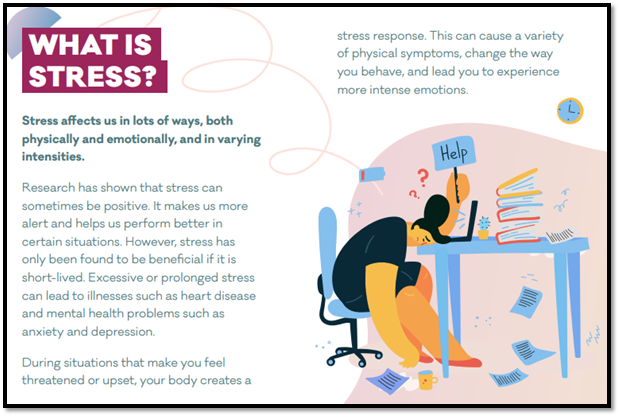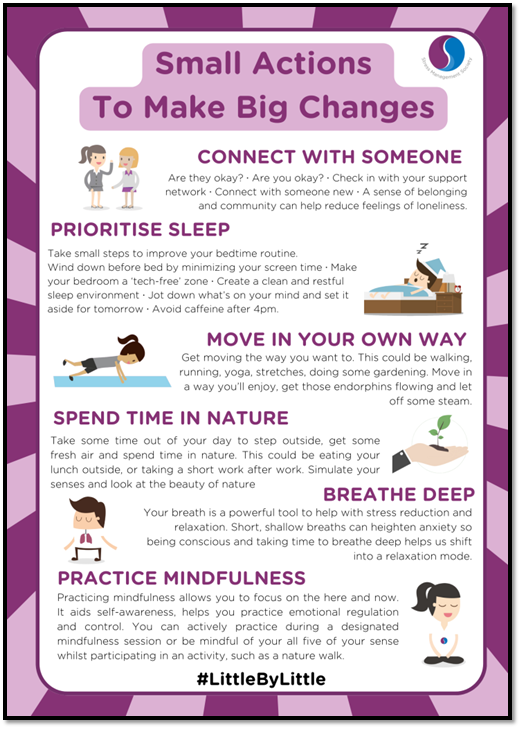Stress Awareness Month: identify triggers of stress and learn how to manage them
02 April 2024
Rachel Butler, Science Subject Advisor

Teaching’s a hard job, right? Having left the classroom very recently, I know exactly what the average teacher deals with. The workload, the marking, planning, the emails… and don’t get me started on the meetings!
Let’s explore together exactly what you can do to make it all a bit easier. How to identify those stress trigger points in your day and what you can do to manage them, restoring a sense of calm. Well, as calm as you can be in a class of 32 pupils all needing something from you, at the same time, all day! Oh, and not having time for a drink, or the loo…teachers have bladders of steel. It’s not all doom and gloom, we know, it truly is the most rewarding of careers.
So give yourself 10 minutes, grab a cuppa (if that’s your thing), and read on.

What is stress?
We have probably all said at some point, maybe several points, that we are stressed. What do we actually mean? Stress, caused by a number of potential triggers, can impact us physically and emotionally, draining the way we feel and how we are able to respond to everyday situations. A bit of stress can be good for us, being good at working under pressure is something that most teachers can identify with. This stress, on a prolonged basis can lead to more severe physical and mental health illnesses.
The Mental Health Foundation UK, in its How to Manage and Reduce Stress Guide describes stress and its effect on the body and mind.

Photo credit – Mental Health Foundation UK
Not everyone is a teacher
We have all heard it before, from our friends and family, haven’t we? “But you have all that holiday! And you only work 9am-3pm, what is there to be stressed about!”. Those who haven’t stepped foot in a school since leaving themselves will never truly understand that permanent level of heightened adrenaline, that baseline level of stress and pressure that’s always there for a teacher. This can make it difficult to talk about how you are feeling and the pressures of the job.
And that’s OK. You know, your colleagues know, we (the subject advisors) know that this job is more than a job, it is a way of life. Teachers do a wonderful job at supporting each other, at all stages of the career ladder to make the job that bit easier. Let’s be honest, the only people that really get what you do are other teachers.
Becoming aware of your stressors
The first step on our journey of becoming more mindful is to be aware of those stress trigger points. By identifying these and learning various coping strategies, it can become much easier to deal with the overwhelming emotion of stress. According to the Mental Health Foundation in the United Kingdom, 61% of adults who felt stressed reported feeling anxious, 46% reported that they ate too much or ate unhealthily due to stress and 37% of adults who reported feeling stressed reported feeling lonely as a result.
It is vitally important we are all more aware of stress, what causes it for us as individuals and how we can tackle it. The Mental Health Foundation UK, recognises that “the pressure of an increasingly demanding work culture in the UK is one of the biggest contributors to stress among the general population... The human costs of unmanaged work-related stress is extensive.”
Teachers know that their working hours are often excessive, and this can be a main contributor to increased stress levels. But it’s worth noting that it is not just the ‘big’ things that can cause stress, it can be the many ‘smaller’ things that add up throughout a teacher’s day. How many of these do you recognise?
- Work emails on your phone, meaning your mind never gets a break from work
- Receiving early morning or late night emails – those ones that request that you do something
- The anticipation of teaching ‘that’ class
- Awaiting “the call” from OFSTED
- Another meeting that could have been an email, when you have a “to-do” list longer than your arm
- Requests to put together work for a pupil when you are already in the middle of a lesson
- A PPA that has been taken up completely by something else when you had a list of things to get done in that hour
- A broken photocopier – or anything to do with photocopiers in general!
- A link that won’t work on your well-planned out lesson
- Having one too few copies for your class – mad rush to the photocopier
- And one just for science teachers - you’ve got the wrong equipment for your practical, and then you realise you made an error on your requisition.
I could keep going here! Any or all of these could feasibly happen within a few hours as a teacher. This is on top of the bigger stressors that teachers deal with, workload, behaviour…it is so important that we have techniques up our sleeves to reduce the impact of stressful situations.
Some simple stress reduction techniques
Here are some five-minute techniques you can do during your work day to reduce stress and tension…
- Breathing exercises. Try counting whilst breathing slowly or using some calming visualising techniques. I wouldn’t try this one whilst in front of a class, perhaps wait until break time and give yourself 5 mins of calming breathing. Try it, it does work, no matter how silly you think it sounds.
- Connect with a colleague. Take 5 mins of your break or lunch to off-load the events of the day so far. And then stop. Don’t allow something that has happened take over your whole break or lunch. Have a moan about it, let your colleague do the same, and then enjoy your break with a bit of laughter and conversation.
- Exercise. I am not suggesting you leave the school site to do a 5K run or start doing laps of the school field. But just 5 minutes of fresh air (combined with some gentle breathing exercises perhaps) could do your body and mind the world of good. A quick lap of the block your classroom is in, a short walk to another block to use the loo, a walk to your car to get a little midday treat… You could even combine this 5-minute walk in fresh air with the tip of connecting with a colleague mentioned above.
We can also consider the techniques we can adopt to reduce stress that are not things you would (normally!) do at school. For example meditating, spending time with friends or working on improving your sleep. You can also practice mindfulness to allow you to connect and focus on the present. Reconnecting with your body and the here and now through your senses can really take your mind away from the stressful situation you are caught up in. There’s lots of mindfulness information available online, including these mindfulness tips from the NHS to get you started.
And if you want some more suggestions of ways to manage stress, The Mental Health Foundation UK has collated 101 tips. Are there any you can do today?
- Watching a funny movie
- Taking a walk in the countryside
- Doing something good for someone else
- Reading a book to distract yourself from stressful thoughts
- Writing a list of things to do and crossing them off as you do them
- Painting or drawing
For Stress Awareness Month 2024, The Stress Management Society is launching #LittleByLittle which emphasises “how even the smallest steps taken each day towards self-care and stress reduction can yield significant improvements in mental health over time”. They suggest how the small daily actions we take can lead to big changes in how we cope with stress:

Photo credit: The Stress Management Society
A month-long stress awareness challenge
Stress Awareness Month is the perfect time to challenge yourself to recognise and reduce your stress. Getting involved with the challenge throughout the month will encourage you to try one thing each day that will benefit your physical, emotional and mental wellbeing. Allow yourself the month of April to identify the stress trigger points throughout your day and attempt some of the 5-minute techniques I have suggested during your working day, or some of the other suggestions listed at the end of your working day.
We are here for you! Are you there for others too?
There’s a wealth of information online about stress and how best to cope with it. These 5 ways to wellbeing from Mind.org.uk are a great place to start. It’s a speedy read, as teachers don’t have time to waste! Plus, the suggestions are realistic and manageable steps you can take.
As well as the information online, remember that your OCR Subject Advisors are here for you too. You may not turn to us for breathing exercises or a catch up over lunch, but if some of your stress is subject related, get in touch! We were all once teachers and we are all here to support you, with specification queries, information about our CPD events, the latest blogs, the latest resources…there is so much we can help you with. Which might just make your day that little bit easier. A recent blog, written by a fellow Subject Advisor, explains what we do and how we can help.
What’s better than making your own day a bit better? Spreading the love and making it easier for other people too. Be the listening ear when you can, we all certainly need that from time to time. Share a resource to reduce workload, sit in the same room to mark, pop the kettle on for your colleague, or maybe just be the person that people know will understand.
Seeking further help
It is important that you reach out for help as soon as possible if you are struggling to manage on your own. Here are some sources of support:
Stay connected
Share your thoughts in the comments below. If you have any questions, you can email us at science@ocr.org.uk, call us on 01223 553998 or message us on X (formerly Twitter) @OCR_Science. You can also sign up to subject updates to keep up-to-date with the latest news, updates and resources.
About the author
Rachel joined OCR in January 2024 and is a subject advisor for GCSE Sciences. Before joining OCR, Rachel was an Assistant Coordinator of Science teaching Biology, Chemistry and Physics to 11–16-year-olds. Rachel was responsible for curriculum planning and assessment in Science as well as overseeing the delivery of engaging practicals. Rachel has spent a large chunk of her career supporting ITTs and ECTs, developing the next generation of teachers. Through her love for the subject, Rachel has a passion for making science accessible for all.